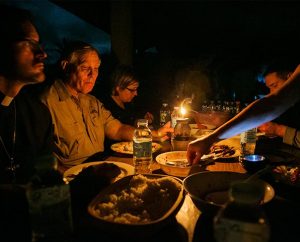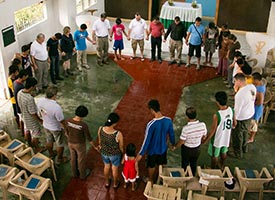By Pamela Nielsen
LEYTE PROVINCE, Philippines — An LCMS Disaster Response team led by the Rev. Glenn Merritt, co-director of LCMS Disaster Response, journeyed to the Philippines Nov. 15-22, following Typhoon Haiyan (known in that country as “Yolanda”). The team came at the request of the Rev. James Cerdeñola, president of the Lutheran Church in the Philippines (LCP).

Arriving on the hard-hit island of Leyte after nightfall on Nov. 17, the group — which included two other LCMS Disaster Response staff: Co-Director Rev. Ross Johnson and Manager Rev. Michael Meyer — immediately entered the disaster zone as they stepped off a ferryboat into a world with no power, lights or communication, a place in which food, water and fuel were in short supply. They were welcomed with open arms by members of the LCP.
LCMS Office of International Mission Asia Pacific staff members Sean Harlow and Michelle Cagnin provided cultural insights, made introductions and arranged details on the ground, including transporting the group to Christ Lutheran Church in the devastated village of Mahayag, Albuera, Leyte. The group lodged in a cluster of small guest bungalows that were without power or running water. Women of the congregation prepared daily meals, which also fed the five families who took shelter at the church after losing their homes in the typhoon.
“Yolanda take my house,” one elderly woman said.
Because the LCP had previously taken part in LCMS international disaster-response training and had a response plan in place, it was able to organize immediately to check on the congregations and pastors in Yolanda’s path and begin to offer immediate aid using LCMS disaster-grant funds. The LCP team was led by the Rev. Antonio Reyes, LCP district president for the Mindanao District, and included the Rev. Sonny Mercado, the Rev. Daniel Pondevida, LCP Human Care Coordinator Genmar Pizarro and an assistant, Chris Ian Domingo.
Acknowledging the partnership between the LCP and the LCMS, Reyes said, “Yes, perhaps the response of the LCP Disaster Response team was quick, but without the help, leadership and support of the LCMS, we could not have responded the way we did, and especially not without the help of our merciful Lord and Savior.”
Over the course of four days, the joint LCP-LCMS team worshiped and met together, using the badly damaged Christ Lutheran Church as the base of their operations. Carrying backpacks filled with energy bars, bottled water and other supplies, the group trekked by foot and vehicle in the hot and humid tropical weather to visit with Lutherans in Mahayag and Tacloban City, located in the center of the storm’s fury.
Christ’s pastor, Xavier James Palattao, led the visitors to the island’s shore, past decimated rice patties, felled coconut trees, broken boats and shredded fishing nets scattering the coast. Walking past — and sometimes through — downed power lines and home after home, either badly damaged or completely destroyed, the group met with church members who had lost both home and livelihood. One woman described Yolanda’s six-hour fury and pointed out the damage to her family’s home and fishing boat. She also shared concerns about the lack of food and water.
The group hiked into the hills to meet the patriarch of an extended family that earns its livelihood by harvesting coconuts. The man reported that 47 of his 50 coconut trees had been snapped off their bases; they now litter the hillside. And several homes belonging to his children were completely destroyed or damaged beyond repair. The typhoon also destroyed the man’s crop of banana trees.
In a nearby town, where St. James Lutheran Church suffered significant damage, congregation and community members gathered to welcome the team, eager to tell their stories about Yolanda and how it changed their lives.
Principals of the three public schools attended by children from the two congregations said they were grateful for the care and concern of the visiting team, and they invited Palattao to assist in providing spiritual and emotional care for the students when they return to classes. The principals said the Lutheran team was the first to visit and check on the schools, and they indicated that school supplies and health kits for the 1,500 school children will be needed.
Palattao stressed that nearly every resident of his community was affected by the typhoon, which damaged or destroyed both homes and livelihoods.
Seeing firsthand the extent and kinds of damage enabled the disaster team to begin to develop a “Disaster Action Plan” that will include immediate, intermediate and long-term assistance aimed at relief, recovery and restoration.
The relief phase, already underway, is focused on distributing food and water to feed the members of Christ Lutheran Church and, if possible, their community. A chainsaw purchased by the team is being used to turn downed coconut trees into lumber that may be sold or used by church members to repair their homes. LCMS disaster grants totaling $250,000 are being used for these relief efforts, which are being coordinated through the LCP.
An additional $100,000 to Lutheran World Relief, Baltimore, will be used for immediate aid in the form of “Shelter Kits” that are designed to help residents make temporary repairs to their homes. Anyone in the community may apply to receive these kits.
Repairing and rebuilding congregation members’ homes was cited as the next priority. The members will work together to provide labor, but tools and building materials will be required to complete the much-needed home construction projects. LCMS Disaster Response staff estimate that $1,500 would cover the cost to repair each home.
In the intermediate phase, temporary restoration of livelihoods is a priority. Cagnin explained that given the length of time it will take to restore original livelihoods — for instance, 15 years for new coconut plants to produce a sellable crop — other options must be explored. Doing so will enable the people to engage in their own recovery and be able to quickly provide for their families.
Due to safety concerns and a shortage of available vehicles, not all of the joint disaster team members made the trip to Tacloban City, the community at the center of Yolanda’s fury. Those who went took a two-hour drive past miles of devastation, burning piles of debris and children lining the roadway begging for food and help.
In Tacloban City, Pastor Nicolas Ranara of Christ Lutheran Church met the group and shared how Yolanda affected his church and members. The sanctuary and part of the parsonage are on the second floor of the building, with the first floor housing both part of the parsonage and a pharmacy that rents space from the church. The storm surge flooded the first floor of the structure, and the pharmacy was looted in the riots that followed the typhoon. There is little to salvage.
The Philippine government is reporting more than 5,200 dead, with the majority of the deaths taking place in Tacloban City; however, no Lutherans lost their lives. The team could smell decaying bodies still buried under mounds of debris. They witnessed the recovery and removal of bodies placed in bags that were eventually carted off in dump trucks and delivered to mass graves.
The Rev. Steve Schave, associate executive director of the LCMS Office of International Mission, traveled to the Philippines as part of the disaster team to bring greetings to LCMS church partners, facilitate the Synod’s pledge to support them, and coordinate the response among LCMS missionaries, the LCP office in Manila and LCMS Disaster Response. Schave said, “A young man approached me. … Seeing my clerical shirt and the crucifix that draped my neck, he asked me if I was a priest. I explained that I was a Lutheran pastor … he asked,’Sir, would you come and pray for my dead?’ I asked for the baptismal names of the three deceased family members, and while not expecting to be in this situation, I quickly turned to the end of the ‘Commendation of the Dying’ in the Pastoral Care Companion that I had in hand.”
Various individuals who were actively searching for their loved ones approached Johnson, seeking him out to tell their story, confess their sins, receive a blessing and have him pray for them.
Every member family of Christ Lutheran Church in Tacloban City lost their home and livelihood, and the damage to the church building there was extensive. Among the three LCP churches on the island of Leyte, it is estimated that some 35 Lutheran homes will need to be rebuilt or repaired, as will countless homes of families in the communities surrounding the churches.
“At this moment, because of grants from the LCMS, members of the Lutheran Church in the Philippines are buying local food and hygiene products. They are packing them and will distribute them to over 5,000 families. The intent is to do this twice as part of the immediate aid. … After the immediate needs are met, LCMS Disaster Response will help the Lutheran Church in the Philippines assess ways to help rebuild homes and livelihood projects that will replace the destroyed coconut industry,” reported Johnson.
Merritt, who is mentoring Johnson and Meyer before he retires next summer, noted, “The magnitude of this disaster is unparalleled in recent history and requires ongoing Christian care and compassion for those who are struggling each day just to survive. LCMS Disaster Response is committed to providing Christ’s mercy that changes lives both in time and for an eternity. The entire disaster-response team displayed exceptional unity and composure under the most difficult of circumstances in the Philippines.”
Documenting the work of the team and the extent of storm damage were staff of LCMS Communications, who also fielded and coordinated multiple media requests for interviews, photos and video footage from the field throughout the week. Among them was Eurasia Missionary Communication Specialist Rick Steenbock, who captured the week on video.
Reflecting on the experience, Schave commented, “While the goals of the trip may have been focused on relief aid and assessment, communication and operations, what I am most thankful for is that wherever we went, we were the church, we were the Body of Christ in that place, we helped our brothers and sisters in Christ across the globe to lift their burdens.”
To learn about LCMS typhoon-relief efforts, visit lcms.org/disaster.
To make a gift in support of the church’s typhoon relief and recovery efforts:
- Visit here.
- Mail checks payable to “The Lutheran Church—Missouri Synod” (with a memo line or note designating “LCMS Disaster Relief – Typhoon”) to The Lutheran Church—Missouri Synod, P.O. Box 66861, St. Louis, MO 63166-6861.
- Call toll-free 888-930-4438 (8:10 a.m. to 4:10 p.m. Central Time, Monday through Friday).
Because the LCMS typically receives nearly half of its annual charitable support in the months of November and December, donors are encouraged to prayerfully consider a gift to LCMS Disaster Response that is in addition to any planned year-end gift intended to help sustain the ongoing witness and mercy work of the Synod.
To see more photos from the Philippines, click here.
Deaconess Pamela Nielsen is associate executive director for LCMS Communications and served as part of the LCMS Disaster Response team in the Philippines.
Posted Nov. 27, 2013 / Updated Dec. 2, 2013
